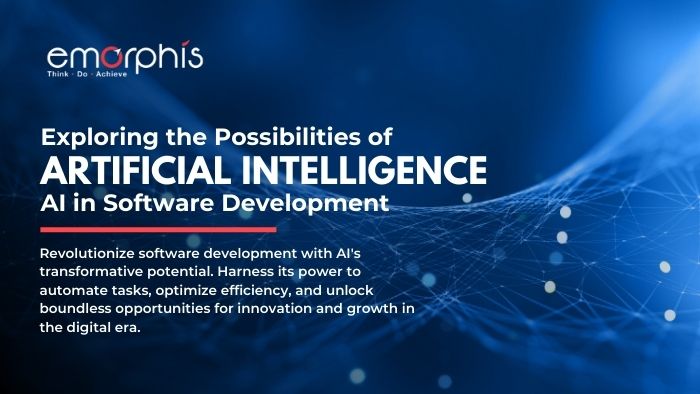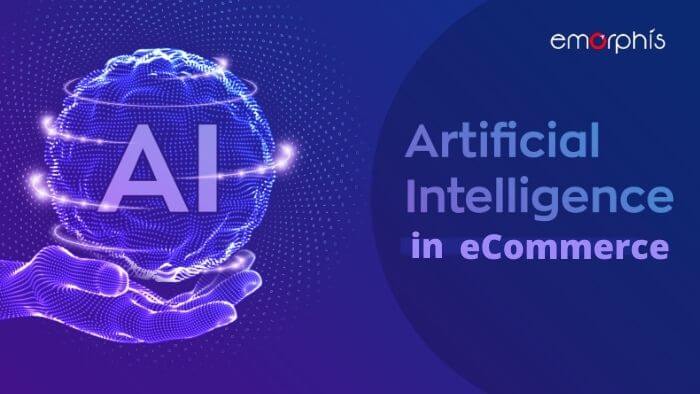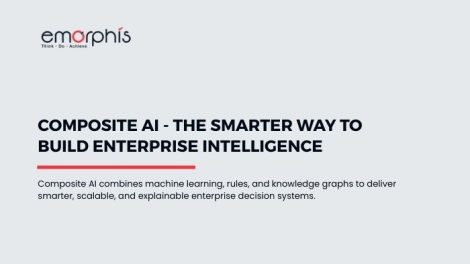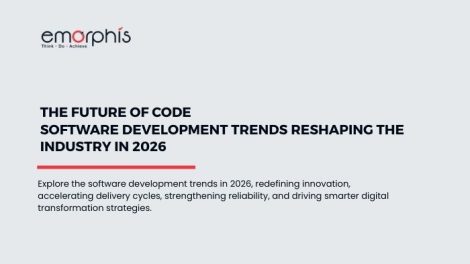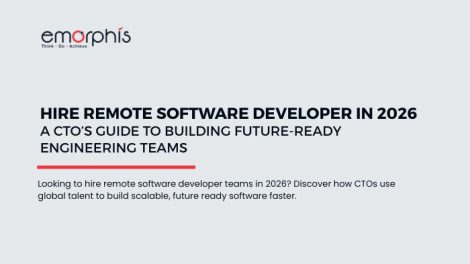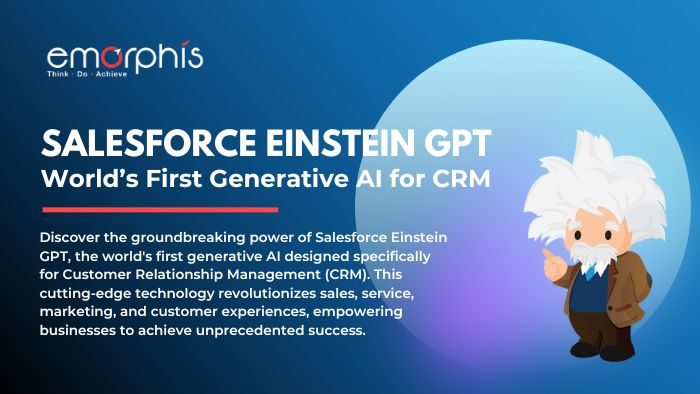Overview
As per a report from Fortune Business Insights, the artificial intelligence market share was valued at US $328.34 billion in 2021 and is projected to reach US $1,394.30 billion by 2028. Businesses worldwide are recognizing the transformative power of artificial intelligence, with 94 percent believing it to be crucial for future success, according to a report by Deloitte. The impact of AI on software development is significant, offering numerous benefits such as improved development processes and agile test automation.
AI in software development has become an essential technology across sectors. By incorporating AI into software development, companies can achieve faster, more reliable, and error-free processes. However, it is essential to partner with an experienced software development company that understands how to leverage AI effectively. The wrong partner can present challenges rather than benefits. To gain a deeper understanding of AI’s potential in software development, let’s explore its capabilities further.

Unveiling the Power of AI in Software Product Development
From enhancing user experience to optimizing processes, AI brings a myriad of opportunities for innovation and growth. Let’s delve into the realm of AI-driven software product development and explore its multifaceted applications, backed by insights from industry leaders and experts.
A. Enhancing User Experience
One of the primary objectives of software product development is to create seamless and intuitive user experiences. AI plays a pivotal role in achieving this goal by personalizing interactions and anticipating user needs. As Satya Nadella, CEO of Microsoft, emphasizes, “AI is at the intersection of our ambitions.”
Consider the recommendation engines employed by streaming platforms like Netflix and Spotify. By analyzing user preferences and behavior patterns, these platforms leverage AI algorithms to curate tailored content suggestions, thereby enhancing user engagement and satisfaction.
B. Streamlining Development Processes
AI-powered tools and frameworks have revolutionized the software development lifecycle, making processes more efficient and cost-effective. Sundar Pichai, CEO of Google, asserts, “AI is probably the most important thing humanity has ever worked on.”
Automated testing and debugging tools, such as those offered by companies like IBM and Amazon Web Services (AWS), leverage machine learning algorithms to identify and rectify errors swiftly, reducing time-to-market and enhancing product quality. Furthermore, AI-driven project management platforms, such as Jira and Trello, optimize task allocation and resource utilization, fostering collaboration and productivity among development teams.
C. Empowering Data-Driven Insights
In the era of big data, harnessing actionable insights is imperative for informed decision-making. AI-powered analytics tools empower organizations to extract valuable insights from vast datasets, driving innovation and competitive advantage. As Andrew Ng, co-founder of Google Brain, succinctly puts it, “AI is the new electricity.”
Platforms like Salesforce Einstein and Tableau leverage AI and machine learning algorithms to analyze customer data, identify trends, and predict future behaviors, enabling businesses to tailor their strategies and offerings accordingly. Moreover, AI-driven predictive maintenance solutions, like those utilized in the manufacturing sector, optimize asset performance and minimize downtime, leading to significant cost savings and operational efficiency gains.
D. Revolutionizing Customer Engagement
AI-driven chatbots and virtual assistants are transforming the landscape of customer service, providing instant support and personalized experiences round-the-clock. According to Mark Zuckerberg, CEO of Meta (formerly Facebook), “Our AI systems today are better than humans at a number of tasks.”
Companies like Zendesk and Intercom offer AI-powered chatbot solutions that can understand natural language queries, resolve common issues autonomously, and escalate complex queries to human agents when necessary, thereby enhancing customer satisfaction and loyalty.
Overall, the integration of AI into software product development holds immense potential for driving innovation, efficiency, and competitiveness across industries. As we continue to unlock the capabilities of AI technologies, organizations need to embrace a forward-thinking approach and leverage AI to its fullest extent, guided by insights from industry pioneers and thought leaders.
As Steve Jobs famously stated, “Innovation distinguishes between a leader and a follower.” Embrace the power of AI, and propel your software product development endeavors to new heights of success.
Expanding the Potential of AI in Software Development, Use Cases for Enhanced Operations
Artificial intelligence has gained significant traction due to its ability to optimize operations across various industries. By automating tasks, AI empowers employees to focus on higher-value activities. Let’s look at some of the use cases of AI in software development.
1. Business Process Automation
One prominent application is business process automation. AI enhances user interfaces, automates routine tasks, and enables businesses to allocate resources to more critical endeavors. Use cases include:
- Analyzing day-to-day business processes to identify root causes and offer effective recommendations for improvement.
- Implementing AI screening tools in HR departments for efficient candidate selection, improving accuracy, and saving time.
- Utilizing AI in customer support to address and resolve customer complaints, enhancing overall customer satisfaction.
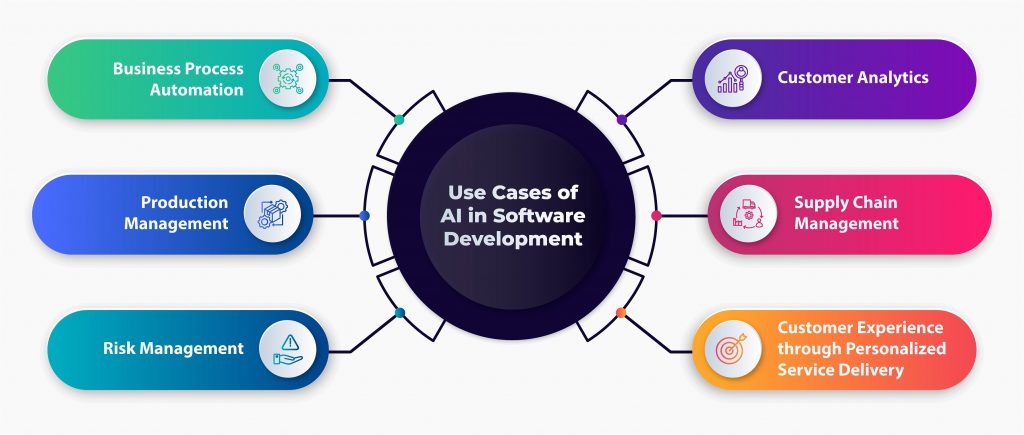
2. Empowering Production Management with Artificial Intelligence
Artificial intelligence (AI) has proven invaluable in managing the complexities and uncertainties of production. By automating tasks, AI saves time and elevates overall quality effectively.
- AI enhances market intelligence by providing real-time information on market trends and with AI in software development, research and development teams can quickly analyze vast amounts of data, also enabling them to focus on developing the right products.
- Predictive maintenance is another critical AI application. By analyzing real-time data, AI identifies equipment failures in advance, improving performance, reducing downtime, and also optimizing machine functions.
- AI also revolutionizes demand forecasting. By leveraging historical data, it predicts future demand, enabling effective production planning. Factors influencing buyer behavior are analyzed, aiding workforce and financial planning for the production department.
3. Revolutionizing Risk Management through Artificial Intelligence
Artificial intelligence (AI) is a vital tool in risk management, empowering companies to analyze vast amounts of data and gain valuable insights for protecting against risks and fraud.
- AI excels in fraud detection, particularly in the banking industry, where it swiftly evaluates numerous transactions, ensuring fast, effective, and efficient identification of fraudulent activities.
- By leveraging extensive data, AI enables accurate prediction of specific outcomes. In construction, for instance, AI can forecast on-site incidents, project overruns, maintenance requirements, and more, mitigating risks proactively.
- Companies utilize AI algorithms to identify patterns of behavior associated with past events, leveraging them as risk predictors, and also enhancing risk management strategies.
4. Leveraging Artificial Intelligence for Customer Analytics
Artificial intelligence (AI) revolutionizes customer analytics by analyzing browsing history on company websites, uncovering customer preferences, and also enabling swift issue resolution through efficient customer service departments.
- AI in software development for analytics empowers marketers to understand customer engagement with products, providing valuable insights for targeted marketing strategies.
- The process of sentiment analysis is enhanced by AI, enabling the classification of customer responses as positive, negative, or neutral. This technology also helps companies identify urgent issues, and current customer preferences, and improve response time, ultimately boosting customer satisfaction.
- By utilizing AI in software development for analytics, companies can collect and analyze data to gain a deep understanding of customer needs, facilitating the development of the right products.
- AI greatly benefits sales teams by identifying high-conversion leads. Salespeople can focus on the most promising prospects, optimizing their efforts to achieve targets within specified time frames.

5. Revolutionizing Supply Chain Management with Artificial Intelligence
According to a McKinsey report, modernizing supply chain management is crucial to navigating uncertainties. AI algorithms play a pivotal role in accurately and swiftly identifying demand patterns, making artificial intelligence an affordable solution for supply-related challenges.
- As per the report, companies leveraging AI-powered forecasting have achieved up to a 50 percent reduction in supply chain errors. In fact, by utilizing AI in software development for demand forecasting, companies can anticipate shifts in consumer demand, enabling effective planning and fulfillment.
- AI significantly enhances inventory management by enabling simultaneous tracking of multiple orders. It also facilitates the identification of inventory issues and factors causing delays in production and shipment. Streamlining inventory processes becomes seamless with AI integration.
6. Enhancing Customer Experience through Personalized Service Delivery
Studies indicate that companies can achieve a 30 percent reduction in customer service costs by leveraging virtual agents and chatbots. These tools improve response time and the overall quality of interactions.
- Artificial intelligence tools play a crucial role in identifying target customer segments and enabling the delivery of high-quality services, thereby enhancing the customer experience.
- In the realm of customer service, AI-powered recommendation engines have gained significant importance. These engines empower marketers to suggest the most relevant products and services, providing a personalized touch to each customer interaction.
Optimizing the Software Development Process with Artificial Intelligence (AI) – AI in Software Development
The timeline of software development projects can vary based on their scale and complexity. To ensure the creation of high-quality software, meticulous planning is essential. Incorporating Artificial Intelligence (AI) into the software development process can significantly enhance its efficiency and effectiveness. In fact, partnering with the right software product development services is crucial to achieving superior outcomes.
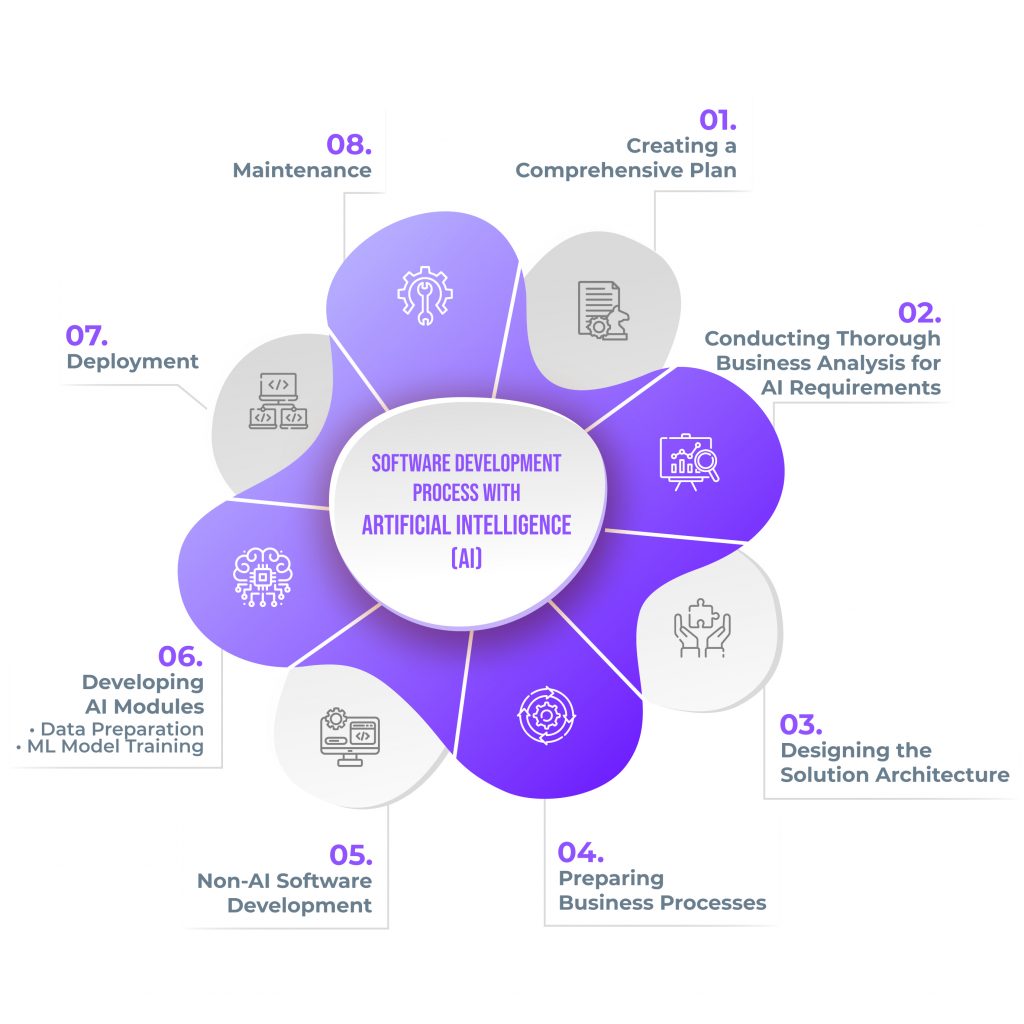
Let’s delve into the key steps involved in this process, empowered by AI:
Step 1. Creating a Comprehensive Plan
During this crucial step, it is essential to fully grasp the project requirements. Additionally, a proof of concept must be developed to validate the feasibility of the idea. The project plan outlines the scope of work, budget, timeline, and also associated risks. Based on our experience, this step typically takes about one month. However, to save time and costs, we recommend engaging a software product development company. Collaborating with such a partner can provide a competitive advantage most efficiently.
Step 2. Conducting Thorough Business Analysis for AI Requirements
In this phase, a meticulous analysis is conducted to identify both functional and non-functional requirements. This analysis helps determine the most accurate AI models suitable for the project’s design. Factors like reliability, accuracy, and privacy are essential considerations when selecting a development model. A reliable software product development partner will ensure transparent communication, providing all necessary details before engagement.
Step 3. Designing the Solution Architecture
This step serves as the blueprint for software development, enabling developers to understand the construction requirements. During this phase, integration patterns and procedures are carefully selected. The duration of this step depends on the project’s complexity.
Step 4. Preparing Business Processes
If AI is utilized in software development, certain adjustments may be necessary. In fact, development companies may modify data policies to address potential issues related to limited data accessibility across departments. Training employees to effectively utilize the new technology is also crucial. Additionally, fostering strong collaboration between the company and the client is important. This step typically spans one to three months.

Step 5. Non-AI Software Development
During this stage, the software development company focuses on building the front and back ends of the software. Also, rigorous quality assurance procedures are carried out to ensure the product meets the specified requirements. The duration of this step can range from three to six months.
Step 6. Developing AI Modules
This stage encompasses the following key steps:
Step 6.1. Data Preparation
In this crucial step, software developers undertake several tasks to prepare the data for AI module development. In fact, they consolidate various data sources, ensuring data consistency and compatibility. Also, exploratory analysis is performed to identify anomalies, outliers, and missing values that need to be addressed. Additionally, data cleansing techniques are applied to eliminate noise and errors. Data labeling is another essential aspect where relevant tags or categories are assigned to the data, enabling supervised learning models. As a matter of fact, proper data preparation is vital to ensure accurate and reliable AI model training.
Hire remote software developers Now!
To optimize the data preparation process, advanced tools and techniques can be employed. These tools help automate data cleaning, normalization, and also transformation tasks, reducing manual effort and enhancing efficiency. In fact, leveraging data integration platforms and data quality tools can streamline the data preparation phase, saving time and ensuring data integrity.
The duration of the data preparation step varies depending on the complexity of the project. In fact, larger datasets or datasets with intricate structures may require more time for thorough cleaning, transformation, and labeling.
Step 6.2. ML Model Training
Once the data is appropriately prepared, the next step is training the machine learning (ML) model. This process involves feeding the organized data into the model and also iteratively adjusting the model’s parameters to minimize the loss function and improve its predictive capabilities.
During ML model training, various algorithms and techniques are applied, such as regression, classification, clustering, or deep learning algorithms, depending on the nature of the problem being addressed. The training data is split into training and validation sets to evaluate the model’s performance and prevent overfitting.
The duration of ML model training depends on factors such as the complexity of the problem, the size of the dataset, the chosen algorithms, and the computational resources available. Training more complex models or handling larger datasets may require more time and also computational power. Additionally, hyperparameter tuning and experimentation with different model architectures contribute to the duration of this step.
It is crucial to monitor the training process, analyze the model’s performance, and also fine-tune the parameters iteratively to achieve the desired accuracy and predictive capabilities. Regular evaluation and validation help ensure that the trained ML model is reliable, accurate, and also aligned with the project’s objectives.
By investing time and effort into data preparation and ML model training, software developers can lay a strong foundation for the successful development and also deployment of AI modules. These steps form the backbone of AI-enabled software systems, in fact, empowering businesses to leverage the power of artificial intelligence to drive innovation, efficiency, and improved decision-making.
Step 7. Deployment
Once the AI modules have been developed and tested, the next crucial step is deployment. A competent software development partner will leverage advanced AI platforms, such as Azure Machine Learning or Amazon SageMaker, and cloud infrastructure to expedite the deployment process. These platforms provide scalable and reliable environments for hosting and managing AI applications.
During deployment, the software development team ensures seamless integration of the AI modules into the software system. In fact, they employ best practices to guarantee compatibility and optimize the performance of the AI components. As a matter of fact, pilot deployments can be conducted to validate the smooth functioning of the AI integration and gather feedback from users or stakeholders.
Additionally, deployment considerations include data privacy and security measures. The software development partner should implement robust data protection protocols and also comply with relevant regulations to safeguard sensitive information and ensure user trust.

Step 8. Maintenance
After the deployment phase, the software enters the maintenance stage. This critical step involves continuous monitoring, bug fixing, and also improvement of the software’s functionality and user experience. The software development company takes responsibility for addressing any issues that arise, such as software errors, system crashes, or performance bottlenecks.
Maintenance activities include:
- Error resolution: The development team identifies and fixes software bugs or anomalies to maintain the software’s stability and also reliability.
- UI/UX enhancement: User interface (UI) and user experience (UX) improvements are made based on user feedback and evolving design trends. In fact, this ensures a seamless and intuitive user interface, enhancing user satisfaction.
- Feature updates: New features and functionalities are designed and implemented to meet evolving user needs and also market demands. Regular updates keep the software relevant and competitive in the rapidly evolving technological landscape.
- Performance optimization: Ongoing monitoring and analysis of the software’s performance allow the development team to identify areas for optimization. In fact, performance-tuning techniques are applied to enhance the software’s efficiency, responsiveness, and scalability.
Maintenance activities are crucial for ensuring the software’s long-term success and also user satisfaction. By promptly addressing issues and continuously improving the software, in fact, the development team can provide a high-quality product that meets the evolving needs of users and keeps pace with technological advancements.
Cost Factors in AI-enhanced Software Development
What factors determine the cost of developing Artificial Intelligence-enhanced software?
The cost of developing artificial intelligence-enhanced software can indeed vary significantly depending on the complexity and scope of the project. As a matter of fact, a moderately complex AI-powered software solution may typically range from US $150,000 to US $250,000. However, it’s important to note that the actual cost can be influenced by several factors, including specific requirements, desired functionalities, data complexities, technology stack, and project timeline.
For more complex AI-powered solutions with advanced features or extensive customization, the price can increase. In such cases, the cost may range from US $550,000 to US $700,000 or even higher, also depending on the intricacies involved.
To obtain precise and detailed information about the cost and development of software with AI, it is recommended to consult a reliable software product development services company. They can assess your specific requirements, provide a comprehensive project evaluation, and offer accurate cost estimates tailored to your unique needs. Connecting with a reputable software development partner will ensure you receive the necessary guidance and expertise throughout the software development journey.
Applications of Artificial Intelligence Across Major Industries, AI in Software Development
Artificial Intelligence (AI) has found extensive applications across diverse industries, driven by its significant advantages. The adoption of AI technology has witnessed a notable surge following the COVID-19 pandemic, as industries recognize the immense benefits of investing in advanced technologies. For instance, the banking and financial services industry has leveraged AI to automate daily operations, enhance stakeholder experiences, and more. Let’s explore some compelling use cases of AI across industries:
A. Enhancing Healthcare with Artificial Intelligence
The healthcare industry has witnessed a rapid integration of Artificial Intelligence (AI) solutions, driven by their potential to revolutionize patient care and operational efficiency. According to reports, the AI in healthcare market is projected to grow from US $14.6 billion in 2023 to a staggering US $102.7 billion by 2028. AI technology offers numerous benefits and applications in healthcare. With healthcare app development services solutions created can help remote patients and also provide quick healthcare delivery. With AI in healthcare, it is now contributing to improved diagnosis, efficient data mining, accelerated drug discovery, also robotic surgery advancements, and more.

One significant area where AI has made a substantial impact is in diagnosis. AI-powered algorithms can analyze medical images, such as X-rays and MRIs, with remarkable accuracy, aiding physicians in detecting and diagnosing diseases more efficiently. Moreover, AI assists in data mining by analyzing vast amounts of patient data, allowing healthcare professionals to identify patterns and insights that can enhance treatment plans and patient outcomes.
In the realm of drug discovery, in fact, AI helps expedite the process by analyzing large datasets and identifying potential candidates for drug development. This accelerates the research and development of new medications, offering hope for improved treatments and also therapies.
Explore opportunities with Healthcare Software Development
AI in healthcare helps build transformative applications
Another transformative application of AI in healthcare is robotic surgery. AI-enabled robotic systems provide surgeons with enhanced precision, dexterity, and control during complex surgical procedures, resulting in reduced invasiveness, faster recovery times, and improved surgical outcomes.
Beyond clinical applications, AI also plays a crucial role in healthcare management. It enables streamlining of administrative tasks, optimizing resource allocation, and improving operational efficiency. AI-powered systems can analyze patient data to predict disease outbreaks, optimize staff scheduling, and also manage inventory, ensuring smoother day-to-day operations within healthcare organizations.
The integration of AI in the healthcare industry has undoubtedly enhanced overall operations, leading to improved patient care, increased efficiency, and significant advancements in medical practices. As AI continues to evolve, its potential to revolutionize healthcare and positively impact the well-being of individuals worldwide is tremendous.
Enhance your legacy systems with Healthcare Integration Services
B. Transforming Retail and E-commerce with Artificial Intelligence
The retail and e-commerce industry has embraced Artificial Intelligence (AI) as a game-changer in enhancing customer experience and driving operational efficiency. In an increasingly competitive landscape, businesses in this sector recognize the need to invest in advanced technologies to stay ahead. AI technology, in particular, offers numerous benefits that revolutionize the way retail and e-commerce operate.
One prominent application of AI in this industry is the use of chatbots. These virtual assistants provide instant and personalized customer support, resolving queries and addressing concerns in real-time. Chatbots offer 24/7 availability, enabling businesses to provide round-the-clock assistance to their customers without the need for human intervention. By automating customer interactions, retailers can improve response times, reduce customer complaints, and enhance overall customer satisfaction.
AI-powered recommendation systems have also proven to be highly effective in the retail and e-commerce sectors. By analyzing customer browsing behavior, purchase history, and preferences, these systems generate personalized product recommendations. This not only enhances the customer experience by presenting relevant and tailored options but also boosts sales and customer engagement. Additionally, AI algorithms continuously learn and adapt to customer behavior, improving the accuracy and effectiveness of recommendations over time.
Connect with us for E-Commerce Software Development
AI algorithms help retailers in management and forecasting
AI technology enables retailers to optimize inventory management and demand forecasting. By analyzing historical sales data, market trends, and external factors, AI algorithms can predict demand patterns more accurately. This empowers retailers to streamline their inventory, minimize stockouts and overstock situations, and improve supply chain efficiency. By having the right products available at the right time, businesses can maximize sales opportunities and minimize costs associated with inventory management.
AI also plays a significant role in pricing optimization. Dynamic pricing algorithms leverage real-time market data and competitor analysis to adjust prices accordingly. This allows retailers to remain competitive, maximize revenue, and capitalize on demand fluctuations. AI-powered pricing strategies enable businesses to adapt quickly to market conditions and optimize their pricing strategies for profitability.
AI has become an indispensable tool in the retail and e-commerce industry, offering a wide range of benefits such as improved customer experience, cost reduction, increased sales, and enhanced operational efficiency. As technology continues to advance, the integration of AI will undoubtedly reshape the retail landscape, empowering businesses to thrive in the digital age.
C. Revolutionizing Banking and Financial Services with Artificial Intelligence
The adoption of Artificial Intelligence (AI) in the banking and financial services sector has been a transformative force, empowering institutions to streamline operations, improve decision-making, and enhance customer experiences. The exponential growth of AI in this industry is a testament to its significant impact.

One of the primary applications of AI in banking and financial services is data processing and analysis. With the vast amount of data generated daily, AI technologies enable financial institutions to efficiently analyze and extract valuable insights. AI algorithms can sift through vast volumes of structured and unstructured data, identify patterns, and predict market trends. This equips financial institutions with the knowledge needed to make informed decisions, optimize investment strategies, and mitigate risks.
Explore more details on Fintech App Development
Automation is another key area where AI has revolutionized the industry. By leveraging machine learning and natural language processing, financial institutions can automate routine tasks, such as data entry, document processing, and compliance checks. This not only improves operational efficiency but also frees up resources to focus on more complex and value-added activities. AI-powered automation reduces manual errors, accelerates processes, and allows staff to concentrate on strategic initiatives that drive business growth.
AI in fintech helps in a personalized approach
Personalized financial products and services have become increasingly prevalent in the banking sector, thanks to AI. By analyzing customer data, including transaction history, spending patterns, and financial goals, AI algorithms can generate tailored recommendations and personalized offers. This level of customization enhances the customer experience, fosters loyalty, and helps financial institutions cater to individual needs more effectively.
AI plays a crucial role in fraud detection and security within the banking and financial services industry. Advanced AI algorithms can detect anomalies and patterns that indicate fraudulent activities, helping institutions identify and prevent potential fraud attempts. Real-time monitoring and analysis of transactions, coupled with AI-powered risk assessment models, significantly strengthen the security measures of financial institutions, protecting both customers and the institution itself.
Furthermore, AI-driven chatbots and virtual assistants have become integral components of customer service in the banking sector. These AI-powered systems provide round-the-clock support, answering customer queries, assisting with account management, and guiding users through various processes. Chatbots improve response times, provide consistent service, and enhance customer satisfaction while freeing up human agents to focus on complex and high-value interactions.
AI has rapidly transformed the banking and financial services industry, enabling institutions to leverage data, automate tasks, develop personalized offerings, enhance security, and improve customer experiences. The continuous advancement of AI technologies will undoubtedly drive further innovation and reshape the way financial services are delivered, fostering a more efficient, secure, and customer-centric industry.
Connect with us for modernizing fintech solutions with AI development services.
D. Transforming Logistics and Transportation with Artificial Intelligence
Artificial Intelligence (AI) has emerged as a game-changer in the logistics and transportation industry, revolutionizing various aspects of operations and supply chain management. With its ability to analyze vast amounts of data and optimize processes, AI has become a crucial tool for improving efficiency, reducing costs, and enhancing customer satisfaction.
One of the key applications of AI in logistics and transportation is inventory management. By leveraging AI algorithms and predictive analytics, companies can optimize inventory levels, reduce stockouts, and improve order fulfillment. AI systems analyze historical data, demand patterns, and market trends to accurately forecast demand and optimize inventory replenishment. This not only minimizes carrying costs but also ensures that products are available when and where they are needed, enhancing overall supply chain performance.
Explore various software solutions development with Software consulting services
Warehouse management is another area where AI has made significant strides. AI-powered technologies, such as autonomous robots and drones, are being used to automate warehouse operations, streamline picking and packing processes, and improve inventory accuracy. These technologies can navigate warehouses, identify and retrieve products, and even assist in packaging and labeling. By automating repetitive and time-consuming tasks, AI improves warehouse efficiency, reduces errors, and enables faster order fulfillment.
Route optimization is another critical aspect of logistics and transportation that benefits from AI. AI algorithms can analyze real-time data, including traffic conditions, weather forecasts, and historical patterns, to identify the most efficient routes for delivery. This helps companies minimize fuel consumption, reduce delivery times, and improve overall fleet performance. AI-powered route optimization also enables companies to proactively respond to disruptions or changes in demand, ensuring timely and efficient delivery operations.
AI in Logistics and Transportation enhancing supply chain
AI plays a vital role in enhancing supply chain visibility and risk management. By leveraging AI technologies, logistics companies can track and monitor shipments in real-time, anticipate potential disruptions, and proactively address issues. AI-powered analytics provide insights into supply chain performance, enabling companies to identify bottlenecks, optimize routes, and improve overall operational efficiency. AI also helps in managing risks by analyzing historical data, detecting anomalies, and predicting potential disruptions, allowing companies to take preventive measures and ensure smooth operations.
As a matter of fact, AI has transformed the logistics and transportation industry by optimizing inventory management, automating warehouse operations, enhancing route optimization, and improving supply chain visibility. By harnessing the power of AI, companies in this sector can streamline processes, reduce costs, enhance customer satisfaction, and gain a competitive edge in an increasingly complex and dynamic market. As AI continues to advance, it will drive further innovation and enable logistics and transportation companies to navigate the challenges of the future with greater efficiency and agility.
E. Transforming Manufacturing with Artificial Intelligence
Artificial intelligence (AI) is revolutionizing the manufacturing industry by enabling various applications. From defect detection to asset inspection and predictive maintenance, AI is streamlining operations and driving efficiency in manufacturing processes. AI-powered robots are taking center stage in manufacturing facilities, performing repetitive tasks with precision and eliminating errors. This automation allows human workers to focus on more complex and strategic aspects of production.
By harnessing the power of AI, manufacturers can optimize their supply chain management, improving inventory control, demand forecasting, and logistics. The integration of AI in research and development processes enables faster prototyping, design optimization, and product innovation. Moreover, AI-powered analytics provide valuable insights into production data, facilitating data-driven decision-making and process optimization.
Adot AI with Industrial software development
The adoption of AI in manufacturing offers numerous benefits, including enhanced productivity, reduced costs, improved product quality, and increased safety. It empowers manufacturers to stay competitive in a rapidly evolving market by leveraging advanced technologies to streamline operations and meet customer demands more effectively. As AI continues to advance, the manufacturing industry is poised for even greater transformations, paving the way for a more efficient and intelligent manufacturing landscape.
F. Transforming the Automotive Industry through Artificial Intelligence
The data shows that the global automotive industry AI market size was valued at US$2.3 billion in 2022. It is expected to reach US$7 billion by 2027. Hence, the automotive industry is undergoing a transformative shift with the widespread adoption of artificial intelligence (AI). AI technologies are driving significant advancements in manufacturing, design, production, and post-production processes.
In automotive manufacturing, AI-powered robotics and automation are streamlining production lines, improving efficiency, and reducing errors. AI algorithms analyze vast amounts of data to optimize operations, enhance quality control, and ensure precision in assembly processes.
Explore Automotive IT solutions with Software consulting services
AI is also revolutionizing vehicle design and engineering. It enables designers to create innovative and aerodynamic designs, improve fuel efficiency, and enhance overall performance. Additionally, AI algorithms simulate and test various scenarios, leading to safer and more reliable vehicles.

Post-production, AI is making significant strides in autonomous driving capabilities. Advanced driver-assistance systems (ADAS) rely on AI algorithms to process sensor data, make real-time decisions, and enhance overall safety on the roads.
Moreover, AI-powered analytics and predictive maintenance solutions are enabling proactive maintenance schedules, minimize downtime, and optimize vehicle performance. AI algorithms analyze vehicle data to detect potential issues, predict component failures, and recommend timely maintenance actions.
As a matter of fact, AI is reshaping the automotive industry, driving innovation, connectivity, and improved customer experiences. As the industry continues to embrace AI technologies, we can expect a future with safer, more efficient, and more intelligent vehicles on our roads.
G. Other Industries
Artificial intelligence (AI) is indeed revolutionizing various industries, including entertainment and gaming, energy, food tech, real estate, and many more.
In the entertainment and gaming industry, AI is used to enhance user experiences through personalized recommendations, virtual assistants, and immersive gameplay. AI algorithms analyze user behavior and preferences to deliver tailored content and improve game performance.
The energy sector leverages AI for optimizing energy consumption, demand forecasting, and grid management. AI-powered systems analyze historical data to identify patterns, predict energy needs, and enable smarter energy distribution.
In the food tech industry, AI assists in streamlining operations, optimizing supply chain management, and enhancing customer experiences. AI algorithms are employed to automate processes, improve inventory management, and offer personalized recommendations based on consumer preferences.

Real estate benefits from AI through automated property valuation, virtual property tours, and intelligent property management systems. AI technologies facilitate faster property assessments, virtual staging, and efficient property maintenance.
To harness the full potential of AI in your organization, it is crucial to partner with a reputable software development company. Experienced software developers can guide you in implementing AI solutions tailored to your specific industry requirements, ensuring optimal efficiency and gaining a competitive edge.
In fact, AI offers a multitude of benefits across various industries, empowering businesses to improve efficiency, enhance customer experiences, and drive innovation. By embracing AI technologies, companies can unlock new opportunities and stay ahead in today’s rapidly evolving digital landscape.
Key Technology Tools to Enhance Your Business Software Solution with AI Development?
Several technology tools can enhance your business software solution with AI development. These tools provide the necessary capabilities to incorporate artificial intelligence into your software systems effectively. Here are some prominent ones:
1. Machine Learning Frameworks
Frameworks like TensorFlow, PyTorch, and sci-kit-learn offer powerful libraries and tools for developing machine learning models. They provide pre-built algorithms, data processing capabilities, and model training frameworks to accelerate AI development.
2. Natural Language Processing (NLP) Libraries
NLP libraries such as NLTK, SpaCy, and Gensim enable businesses to process and understand human language. These tools support tasks like sentiment analysis, text classification, language translation, and entity recognition, which can be leveraged in chatbots, customer support systems, and content analysis.
3. Deep Learning Platforms
Deep learning platforms like Keras, Caffe, and Theano provide comprehensive frameworks for building deep neural networks. These platforms allow for complex pattern recognition, image processing, and speech recognition tasks, making them valuable for applications such as image classification, voice assistants, and computer vision systems.
4. Cloud Services
Cloud providers like Amazon Web Services (AWS), Microsoft Azure, and Google Cloud offer AI services and infrastructure for scalable and efficient AI development. These services include pre-trained models, automated machine learning, and GPU-accelerated computing for training and deploying AI models.
5. Data Analytics Tools
Tools like Apache Spark, Hadoop, and Apache Flink enable businesses to process and analyze large volumes of data efficiently. These tools facilitate data preprocessing, feature engineering, and data visualization, which are essential for AI model development.
6. Robotic Process Automation (RPA) Platforms
RPA platforms like UiPath, Automation Anywhere, and Blue Prism combine AI and automation to streamline business processes. These platforms automate repetitive tasks, data entry, and decision-making processes, improving operational efficiency and reducing human error.
By leveraging these technology tools, businesses can enhance their software solutions with AI development. These tools provide the necessary infrastructure, libraries, and frameworks to incorporate AI capabilities seamlessly, enabling businesses to gain insights, automate processes, and deliver intelligent solutions.
Accelerating Business Success with Cloud-based AI Platforms
Unleashing the Power of Amazon SageMaker, Azure Machine Learning Services, and Google AI Platform.
a. Amazon SageMaker: Empowering Cloud-Based Machine Learning
Amazon SageMaker is a leading cloud-based machine learning platform that empowers developers to efficiently create, train, and deploy machine learning models. With its robust features and streamlined processes, SageMaker simplifies the development and deployment of machine learning models in a production-ready environment.
Key Features of Amazon SageMaker:
- Data Integration: SageMaker allows you to easily import data from various sources, eliminating the need for time-consuming data preprocessing and integration tasks. This enables developers to focus on model development rather than data management.
- Workflow Optimization: The platform streamlines the end-to-end machine learning workflow, reducing duplicate work and accelerating the development process. SageMaker automates common tasks, such as feature engineering and hyperparameter optimization, saving valuable time and effort.
- Security and Compliance: SageMaker ensures that data and models are secured through encryption, access control, and compliance with industry standards. It provides built-in features for data privacy and protection, allowing businesses to meet their security and regulatory requirements.
- Pre-built Algorithms and Models: Amazon SageMaker offers a rich collection of pre-built machine learning algorithms and models, including popular frameworks like TensorFlow and Apache MXNet. These ready-to-use resources enable developers to quickly start building and training models without the need for extensive coding.
b. Azure Machine Learning Services: Streamlining the ML Project Lifecycle
Azure Machine Learning Services is a comprehensive cloud service designed to manage the entire machine learning project lifecycle. It provides developers with the necessary tools and capabilities to train, deploy, and manage machine learning models efficiently.
Key Features of Azure Machine Learning Services:
- User-Friendly Interface: Azure Machine Learning Services offers a user-friendly interface and a wide range of tools to simplify the machine learning development process. It provides drag-and-drop functionality, visual model building, and easy integration with popular development environments.
- Flexible Deployment Options: The platform supports flexible deployment options, allowing developers to deploy their models either in the cloud or at the edge. This flexibility enables businesses to choose the deployment strategy that best suits their specific needs and requirements.

c. Google AI Platform: Building and Managing ML Models
Google AI Platform is a robust platform that enables developers to build, deploy, and manage machine learning models. It provides a comprehensive set of features and tools to support the entire project lifecycle.
Key Features of Google AI Platform:
- Kubernetes Orchestration: The platform leverages Kubernetes orchestration to manage the deployment and scaling of machine learning models. This ensures efficient resource allocation and enables seamless integration with other Kubernetes-based applications.
- TensorFlow Enterprise Support: Google AI Platform offers extensive support for TensorFlow Enterprise, a version of TensorFlow optimized for enterprise-grade machine learning applications. This support provides enhanced performance, reliability, and scalability for TensorFlow-based models.
- Startup-Friendly Environment: Google AI Platform is designed to support startups and smaller teams by offering cost-effective solutions and easy-to-use features. It provides accessible resources and tools to help startups accelerate their machine-learning initiatives without significant infrastructure investments.
These cloud-based AI platforms, including Amazon SageMaker, Azure Machine Learning Services, and Google AI Platform, provide developers with powerful tools and resources to enhance their business software solutions with AI development. By leveraging these platforms’ features and capabilities, businesses can accelerate their machine-learning initiatives, improve model development, and drive innovation in their respective industries.
Why Choose Emorphis Technologies for Your Software Product Engineering and Development Needs?
Selecting the right software development partner is crucial for achieving your business objectives. Emorphis Technologies stands out as a leading choice in the field of software development, especially with the integration of artificial intelligence technology. Our experienced developers leverage the power of AI to deliver high-quality software solutions that are tailored to your specific requirements.
By incorporating artificial intelligence, our software products are designed to automate tasks, streamline processes, and enhance overall efficiency. With our skilled team and cutting-edge technologies, we ensure that your software development project is executed with utmost precision and innovation.
Furthermore, Emorphis Technologies understands the diverse applications of artificial intelligence across various industries, as highlighted in this blog. We have extensive expertise in harnessing AI capabilities to create software solutions that cater to different sectors, providing you with a competitive edge.
If you are looking to leverage the potential of artificial intelligence in your software development journey, Emorphis Technologies is your trusted partner. Connect with us today to explore how we can transform your ideas into robust and intelligent software solutions.



